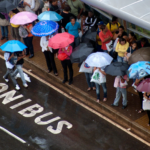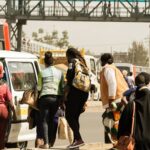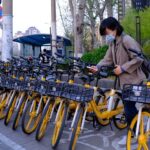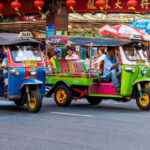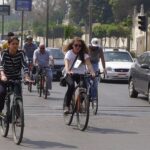Posts in the 'Integrated Transport' category
With growing urban populations and increases in cars, trucks and buses, cities are poised to experience more harmful pollution threatening people’s health and livelihoods. But some cities around the world are turning to an emerging solution called zero-emission zones (ZEZs). These are designated ...

The adoption of any new technology involves some degree of adaptation, and battery electric buses (e-buses) are no exception. After decades of experience with diesel vehicles, cities and operators need to understand the technical and operational specifications of e-buses to ...

Since the mid-2010s, cities around the globe have witnessed the explosion of free-floating electric bikes, mopeds and scooters on their streets. NUMO, the New Urban Mobility alliance, began tracking this phenomenon in 2019 with the New Mobility Atlas. Between 2019 and ...

For a woman living in an African city, public transport can be a daunting experience. Women usually plan their trips in advance, and consider a multitude of factors before setting out: What is the safest way to reach the bus ...

Public transport is one of the best, most cost-effective solutions available to address today’s climate and development challenges. Buses and trains can reduce greenhouse gas (GHG) emissions by up to two-thirds per passenger, per kilometer compared to private vehicles. The UN’s latest ...

A new digital platform being piloted in cities around the world is making public transportation more efficient, economical and accessible, while encouraging low-carbon travel. Mobility-as-a-Service is an on-demand service that integrates various forms of transportation services into a single platform accessible ...

In Asia, 14 countries — accounting for 26% of global transport emissions in 2019 — have made economy-wide net zero commitments. Momentum towards zero-emission transport is growing with countries enhancing ambition and including transport-related targets in their nationally determined contributions (NDCs). However, ...

As cities across Africa experience rapid growth and increased demand for mobility, there is an urgent need to transition towards more sustainable and effective urban transport systems. The urban planning decisions made today will shape cities for decades. However, improvements ...

Over 50% of all transport-related emissions come from high-income countries, where people are more likely to own and depend on personal vehicles. Meanwhile, less than 1% is generated by low-income countries in regions like sub-Saharan Africa and Latin America. In these ...

In Africa, as elsewhere, advances in computing power, data storage, and sensor and satellite technologies have unleashed unprecedented opportunities but also challenges. The mobile phone has become a powerful tool for generating vast amounts of data. This data can, in ...

In the Wadala neighborhood of Mumbai, representatives from Kigali, Durban and Mauritius filed into a low, yellow-walled room. They took their seats in rows equipped with desktop computers. Ordinarily, these desks would be filled with the staff responsible for tracking real-time ...

You start the day frustrated, your alarm clock ringing 30 minutes earlier than usual to try to beat the thousands of other morning commuters out the door. Battling bottlenecks has become your daily drill, from the side road shortcuts to ...

As cities become more congested, traffic fatalities continue to rise and the impacts of climate change escalate, the need for sustainable and safe transportation solutions has reached a critical juncture. The World Health Organization reports an alarming statistic: 186,300 children ...

To cut transport emissions, moving vehicles away from burning fossil fuels is a fundamental step. However, the e-mobility transition is not only an opportunity to reduce emissions but to modernize mobility across the board, from expanding access to public transport ...

Getting around any megacity as dense and vast as Cairo, Egypt can be a challenge, even for the most able-bodied, well-traveled and well-informed commuter. The plethora of options for transport modes and routes has made it difficult to decode and ...

Page 1 of 135123...1020...Last »











